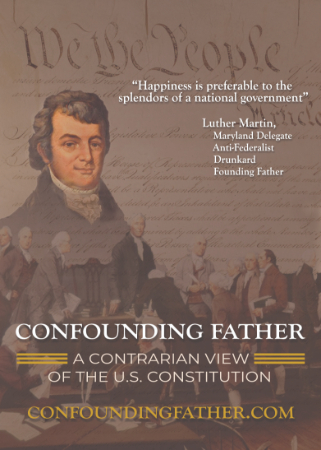
Confounding Father: A Contrarian View of the U.S. Constitution 2020
Distributed by Docuseek2
Produced by Richard R. Hall and Simone L. Fary
Directed by Richard Riggs Hall
Streaming, 118 mins
College - General Adult
Government; Political Science; U.S. History
Date Entered: 02/02/2021
Reviewed by Russell A. Hall, Reference and Instruction Librarian, Penn State ErieConfounding Father: A Contrarian View of the U.S. Constitution examines the contentious Constitutional Convention of 1787. Director Richard Riggs Hall (no relation to this reviewer) looks at the debates in the convention through the lens of Maryland delegate Luther Martin. Martin is a wonderful choice because he was a complicated, problematic, and highly intelligent man. A perfect example of this is the title of a biography of Martin entitled, Forgotten Founder, Drunken Prophet (written by Bill Kauffman whose interview clips appear throughout the film). The film also includes portions of interviews with several scholars, most notable are Gordon Wood and the late Pauline Maier, eminent historians of the subject under examination.
From 1781 until the ratification of the constitution by the states in 1789, the U.S. was governed by the Articles of Confederation. The film neatly lays out the main problems with the Articles and why many of the founders felt the need to modify them via a convention. What many, including Luther Martin, did not count on was a convention to dispose of the Articles altogether and draft a new constitution, all in secret. Confounding Father goes on to skillfully examine the arguments between the Federalists (in favor of the new constitution) and the so-called Anti-Federalists in the convention. The film does a very good job in making sure the viewer understands that the mythical “Founding Fathers” were by no means of one monolithic mindset about the creation of the constitution and what should be included in that document. Further, the movie demonstrates that the Anti-Federalists should not actually be lumped together as a group because they had myriad and quite often differing views of why the constitution should not be adopted with some examples being: the slave trade, the 3/5ths clause, and making the states subservient to the federal government. Luther Martin was fundamentally opposed because he felt that the convention only had the right to amend the Articles, not draft a new governing document. The film closes by noting the addition of the Bill of Rights to the Constitution was due to the demands of the Anti-Federalists and that we, the people of today, glorify the founders for our individual rights, but are too often forgetful or ignorant that it was the Anti-Federalists who had to demand those rights.
Confounding Father makes deft use of excerpts from mid-20th century educational films and portions of archival videos. These clips are explanatory and yet give a sense of fun to the film. They also help with the pacing, as they are not too long, nor are they jarring in transitions. These segments are sure to help keep students’ attention focused on the film. Educators will be thankful that Confounding Father is divided into four episodes of roughly a half hour each. This way the instructor can easily fit an episode into a class session and have discussion afterwards or watch it in the traditional longer form.
Confounding Father: A Contrarian View of the U.S. Constitution is well-suited for any lower-level undergraduate course teaching about the foundations of the U.S. government, as well as for viewing by the general public.
Published and licensed under the Creative Commons Attribution 4.0 license. Anyone can use these reviews, so long as they comply with the terms of the license.